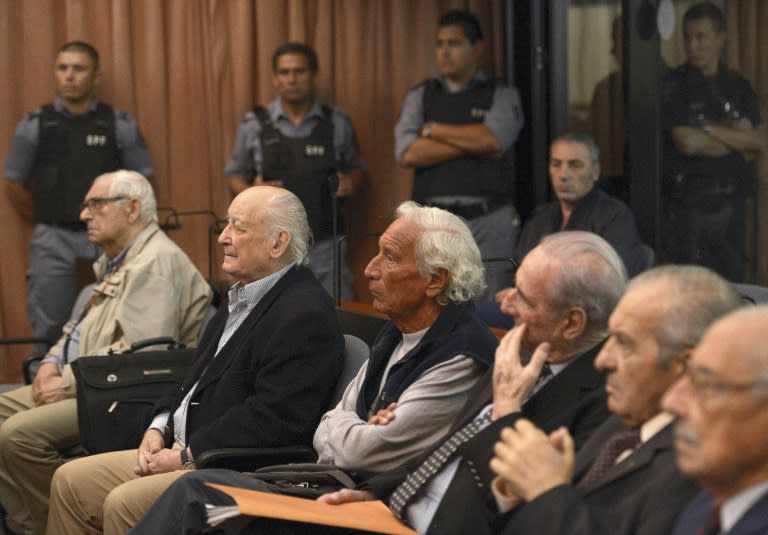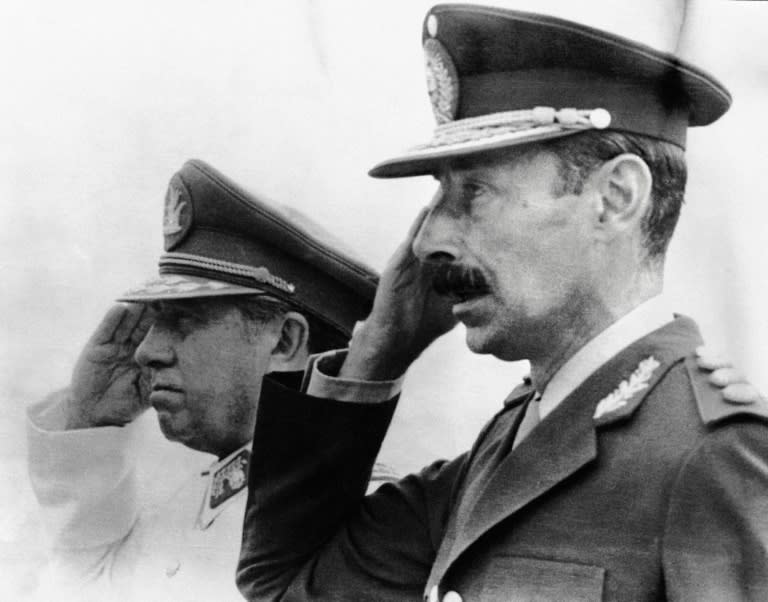Judgment day for historic South America repression
South American ex-military leaders face judgment Friday accused of collaborating to torture and assassinate leftist dissidents in a US-backed crackdown during the region's dictatorships in the 1970s and 1980s. An Argentine court is trying 18 former army officers accused of taking part in Operation Condor, in which the military regimes of Argentina, Bolivia, Brazil, Chile, Paraguay and Uruguay helped each other track down and kill leftist dissidents. On Friday the court is due to deliver its verdict after a three-year trial -- the first to try the crimes committed under the Condor plan. The operation began in the 1970s at the height of the Cold War. It is blamed for scores of executions and kidnappings -- 89 in Argentina alone. Prosecutors based their case partly on declassified US intelligence documents showing how the South American regimes worked together to identify political exiles in neighboring countries and kill them or send them back to their home countries. The documents go into grisly detail about the bureaucracy of repression, such as the formal authorization Uruguay's intelligence services had to assassinate opponents in Argentina or ask the ruling junta there to take them out. The various regimes communicated with each other using a telex system dubbed "Condortel." Officers were trained to use it at the infamous School of the Americas in Panama, a US training center that drilled repressive Latin American regimes in counter-insurgency tactics. "The trial has allowed us to better understand Operation Condor," victims' lawyer Luz Palmas said. "Until now, historians and journalists were the only ones who had carried out investigations." - Stolen baby - The cases include harrowing stories such as that of Maria Garcia and Marcelo Gelman. The militant anti-regime couple were arrested in Argentina on August 24, 1976 and taken to an auto workshop that regime agents had transformed into a torture chamber. Gelman was killed. Garcia, who was seven months pregnant at the time, was transferred to her native Uruguay under Operation Condor where she was then "disappeared." Garcia's family still does not know exactly what happened to her. Garcia's daughter was born in captivity and given to a family of regime sympathizers to raise. She learned her real identity only through blood testing in 2000, when she was 23 years old. - Two ex-presidents accused - Hundreds of army officers and police have been tried in Argentina for atrocities carried out under the country's 1976 to 1983 dictatorship. Amnesty laws have protected others, notably in Brazil. Operation Condor itself had never been the subject of a trial until the current case opened in February 2013. "It's the first verdict on Operation Condor as a coordinated structure for repression," said Gaston Chillier, head of Argentine rights group CELS. There are 17 Argentine officers on trial and one Uruguayan: former colonel Manuel Cordero, 77. Prosecutors sought numerous suspects in other countries, but their extradition requests were refused. Among the accused is Argentina's last military dictator, Reynaldo Bignone. Now aged 88, he faces 20 years in prison, on top of the 15 he is already serving for the theft of babies born to political prisoners. Jorge Videla, who ruled Argentina from 1976 to 1981, also faced charges, but he died in prison in 2013 at age 87. Videla was serving sentences for the abduction of babies and killings of dissidents. The court examined evidence relating to 105 victims from Uruguay, Chile, Paraguay, Bolivia and Argentina. "Many countries, particularly neighboring ones in Latin America, are awaiting this as one of the most important judgments a court has made," the CELS said in its plea statement.

 Yahoo Finance
Yahoo Finance 


